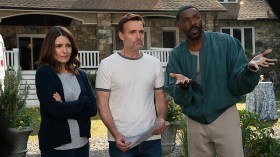Pulp: a Film about Life, Death & Supermarkets opens with a live rendition of the band’s 1995 breakout hit ‘Common People’. This is happening in their final reunion concert in their hometown of Sheffield and it is enthralling to see fans dancing wildly and knowing all the words to the song, especially when chiming in to its best line, ‘I want to sleep with common people like you.’
Unlike their Britpop contemporaries Blur and Oasis, Pulp’s lyrics always carried a sense of gritty realism. Pulp never dreamed about being a rock n’ roll star, but boldly dived into the squalid excesses of voyeurism, violence, petty crime and most strikingly, sex. As remarked by an academic in the film, the sex in Pulp is never sexy, nor does it happen ‘all night long’. For Pulp, sex is embarrassing and messy, and it is Pulp’s indulgence into such sordid affairs that is highly engaging for fans, or the common person.
Pulp the film undeniably reflects the band’s embrace of authenticity, by interweaving interviews with its band members and their fans. Pulp’s drummer Nick Banks tells a delightful anecdote about the band sponsoring his daughter’s football team. The band’s name is etched across their jerseys and his daughter hastily explains to her team members, ‘It’s me dad’s crap band.’ Sheffield residents get the opportunity to give their own stories concerning the band, and of their lives in Sheffield. Most intriguingly, it is these ordinary people that act as a narrating device of the film. Regardless of age, these people are unafraid in revealing their love of dance, their favourite Pulp song or even of frontman Jarvis Cocker’s sexually charged thrusts onstage.
Currently fifty years of age, the bespectacled Cocker still carries a certain enigma around him. Among Cocker’s most passionate fans, he has his names etched in underwear. His bemused band members describe him as ‘an exhibitionist’, and someone who has the ‘potential to be a common person’. Yet, the film does not exactly unravel the mystery or appeal of Cocker, and instead depicts him as a gentle, intriguing figure. He has a cup of tea before a concert as it is ‘good for your throat’, and ponders on what his generation would be like as pensioners (probably singing ‘I like to move it, move it’).
Ultimately, Pulp the film is not entirely about Cocker, or the five-piece. The documentary makes an effort in disclosing the ‘normal’ lives of successful musicians; their lives are not exactly glamorous and their experiences are even similar to a regular person’s. Director Florian Habicht deliberately displays a certain tenderness in portraying the ‘common person’. From a young musician who has run away from an asylum, a jolly newspaper vendor, or members of a senior Sheffield choir, their candid opinions and keen passions are immensely genuine and are treated with the utmost respect.
Pulp the film acknowledges ‘the people of Sheffield’ in its starring credits and this certainly rings true. This rockumentary does not go down the conventional route of examining the band’s origins, or their personal lives. In fact, Pulp takes a backseat in this documentary; Pulp the film, is very much a warm, heartfelt tribute to the common people — they are real, their life experiences are valid and they sure can dance.
Rating: 4 ½ stars out of 5
Pulp: a Film about Life, Death & Supermarkets
Director: Florian Habicht
UK, 2014, 90 min
Melbourne International Film Festival
www.miff.com.au
31 July – 17 August
Actors:
Director:
Format:
Country:
Release:





